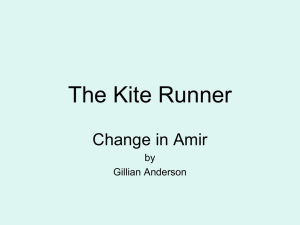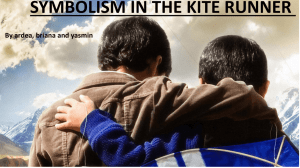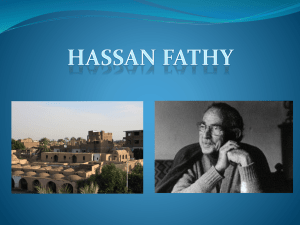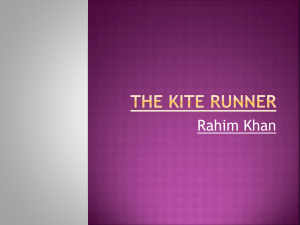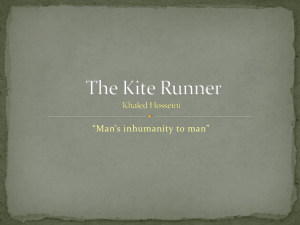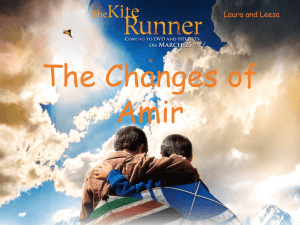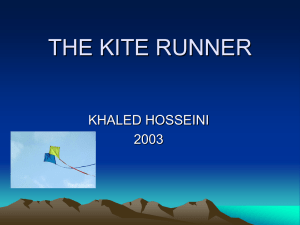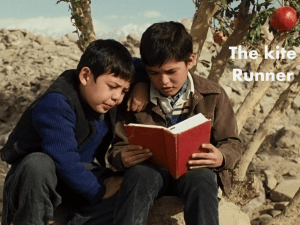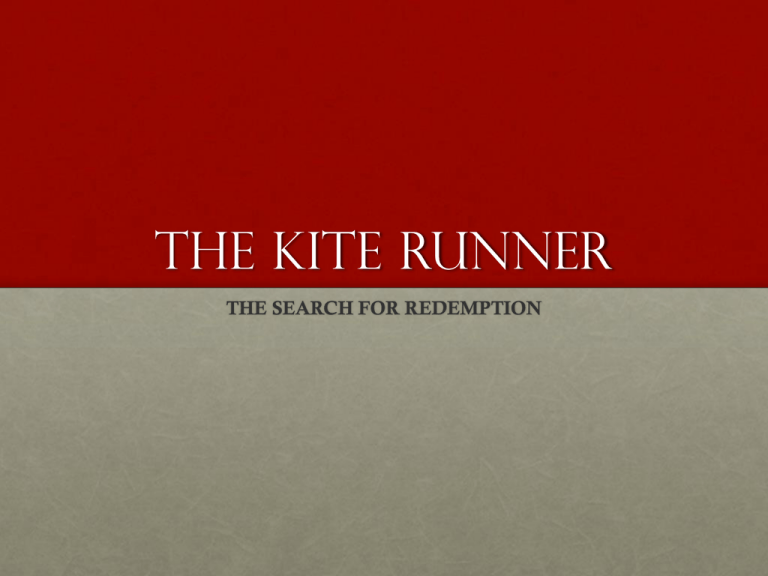
THE KITE RUNNER
THE SEARCH FOR REDEMPTION
AFGHANISTAN: A
WORLD OF DIVISIONS
There are several divisions within Afghan society during the 1970’s.
Hosseini explains these divisions through the characters of Baba and
Amir on one side and Ali and Hassan on the other.
• Religious: Amir’s family is Sunni and Hassan’s family is Shi’a. Both
religions acknowledge in the same basic beliefs, however they
practice their religions in different ways.
• Economic: Amir and Baba are extremely wealthy and live in a
mansion, whilst Hassan and Ali live in a hut and work as Baba’s
servants.
• Ethnic: Amir and Baba are Pashtun, while Hassan and Ali are
Hazara. It is the ethnic divide that dictates the economic divide. The
Pashtun’s are the most dominant ethnic group and overpowered the
Hazaras early on in Afghani history. Hence the Hazaras are inferior
to the Pashtun.
The ethnic divide
How does ethnicity divide the characters and seal their fate?
Ethnic divide: more
powerful than love
The ethnic divide is powerful. It dictates the lives of Ali, Amir, Baba and Hassan:
• The ethnic divide (as well as Baba) prevents Hassan and Amir from truly being
friends. ‘I never thought of Hassan and me as friends…Because history isn’t easy to
overcome. Neither is religion. In the end, I was a Pashtun and he was a Hazara, I was
Sunni and he was Shi’a, and nothing was ever going to change that. Nothing.’ (22)
• The ethnic divide prevents Baba from publically claiming Hassan as his son.
• It robs Ali of his dignity and allows Baba to cuckold him and have a son with
his wife Sanaubar. Worse still, Ali is forced to work for Baba and accept his
gifts all the while knowing Hassan his not his son.
• It robs Hassan from the chance of becoming educated. ‘That Hassan would grow
up illiterate like Ali and most Hazaras had been decided the minute he was born…’
(24) However, the reader and Amir know Hassan is intelligent because Amir
admits that he stopped reading Hassan riddles because, ‘I saw he was far better at
solving them than I was.’ (24)
• Amir and Baba have the money to flee Afghanistan, while Ali and Hassan
must remain.
Class and ethnic
division
• In Afghanistan in the 1970s (the setting of the novel) the
Hazara’s had very little power as they had no education
and therefore could not change their position. So in
Afghanistan you ethnicity determines your class (or
economic status).
• This reveals the way class/ethnicity can affect the amount
of power an individual has in a society. Those who are
from a higher class have the advantage of education and
wealth, which allows those groups to have power. Whereas
those from a lower class have little access to education and
wealth, which means they can never improve their status.
Betrayal
Which characters betray each other and themselves?
Which character is the sacrificial lamb?
Baba’s betrayal
Baba betrays Amir, Ali and Hassan by fathering Hassan and keeping the secret, all the
while posing as a virtuous and honest man. He tells Amir that, ‘There is no act more
wretched than stealing, Amir…a man who takes what is not his to take…I spit on such a man.’
(16) Yet, Baba steals Ali’s pride and impregnates Sanaubar. Baba steals Amir’s right to
know that Hassan was his brother. Baba steals Hassan’s right to know who his true father
was. Baba betrays his own beliefs.
Amir’s betrayal
When Hassan is assaulted by Assef, Amir betrays Hassan by
choosing to run away, rather than protect Hassan. ‘I ran because I
was a coward.’ (68)
Amir Tries to avoid the guilt
Amir tries to avoid the guilt of his betrayal, by avoiding Hassan. Eventually,
Amir betrays Hassan and Ali again, by setting up Hassan so it looks as if
Hassan stole from him and Baba, ‘I lifted Hassan’s mattress and planted my new
watch and a handful of Afghani bills under it.’ (91) When Hassan admits to stealing
the items (although Hassan is innocent) Amir realizes that, ‘…This was Hassan’s
final sacrifice for me. If he’d said no, Baba would have believed him…then I’d be the
accused; I would have to explain and I would be revealed for what I really was…And
that led to another understanding: Hassan knew…He knew I’d betrayed him.’ (91)
Hassan is the sacrificial lamb
One of the Muslim religious holidays (Eid-e-Qorban) involves sacrificing an
innocent lamb in memory of Ibrahim who almost sacrificed his own son for God.
Hassan plays the role of the innocent lamb in Amir and Baba’s lives. Baba
sacrifices Hassan by refusing to acknowledge Hassan as his own son, therefore
protecting his own reputation. Amir sacrifices Hassan to protect himself and gain
the blue kite which Amir believes earn him Baba’s love and approval. When Amir
is watching Hassan being assaulted he thinks, ‘Maybe Hassan was the price I had to
pay, the lamb I had to slay, to win Baba.’ (68)
The Symbolism of the Alleyway
Although Amir tries to forget the way he betrayed Hassan, it haunts him
for most of his life. It shapes his life. This is revealed in the opening
chapter, ‘I became what I am today at the age of twelve…crouching behind a
crumbling mud wall, peeking into the alley…it’s wrong what they say about the
past…about how you can bury it. Because the past claws its way out. Looking
back now, I realize I have been peeking into that deserted alley for the last twenty
six years.’ (1)
How did the alleyway define Amir’s character?
The alleyway
• Amir chose to be a coward in the alleyway. This cowardice is
continued into his adult life. E.g. When Amir and Baba escape
Afghanistan a Russian soldier stops their truck. The soldier
decides he will only let them leave if he can have sex with one
of the women. Amir begs his father not to intervene because he
is frightened about what will happen if baba does.
• Amir felt guilt for not protecting Hassan in the alleyway. He
continues to relive this guilt for most of his life.
• Amir cannot escape the alleyway. He has spent most of his life
‘peeking into that deserted alley’. Meaning that Amir has spent
most of his life reliving that moment and wishing he had done
something. Amir is forced to return to the scene of his crime
and save Hassan’s son.
What is the significance of the
story of Rostam and sohrab?
Hassan and Amir both love the story of
Rostam and Sohrab which is told in the
epic Iranian poem "Shahnameh”.
Rostam is a great warrior who battles an
unknown competitor on the battlefield.
He finally kills the man only to discover
that it is Sohrab…his long lost son.
Interestingly, Sohrab knew that Rostam
was his father the whole time he was
fighting him.
There are many similarities
between the Iranian story and
Amir and Hassan’s own lives.
Readers are told of this story,
very early on in the novel and
so the tale of Rostam and
Sohrab foretells what will
happen to Hassan and Amir.
Rostam and Sohrab is the
story of baba and Hassan
• Just like Rostam, Baba has a son who is lost to him. In this case, Hassan
does not know Baba is his father and Baba cannot publically
acknowledge Hassan as his child.
• Just like Sohrab knows that Rostam is his father, Hassan knows Baba is
his father, as revealed by his sorrow when he dicovers Baba has died,
‘Hassan buried his face in his hands and broke into tears. He wept like a
child.’ The comparison to the ‘child’ reveals that Hassan was probably
aware of who is real father was.
• Just like Rostam, Baba leads Hassan to death. Hassan, unrecognized as
Baba’s son, is considered a Hazara and lives in poverty with Ali, the
man he believes is his father. Ali and Hassan cannot afford to escape
Afghanistan and face death at the hands of the Taliban.
• Ironically, Hassan is the type of son Baba would have preferred. Baba
admires Hassan’s courage and athleticism. Baba complains of Amir’s
lack of courage saying, ‘You know what always happens when the
neighbourhood boys tease him? Hassan steps in and fends them off.’ (20)
Rostam and Sohrab is also
the story of Hassan and
Amir
Sohrab knew his was fighting his father. However,
Rostam did not know that he was fighting his son until
his son is dead.
This is similar to the way Hassan knew that Amir was
watching him being assaulted in the alleyway, even while
Amir believed his cowardly act was a secret.
Amir doesn’t find out that Hassan knew about his
cowardice until Hassan and Ali leave, as revealed by
Amir’s recollection, ‘And that led to another understanding:
Hassan knew…He knew I’d betrayed him.’ (91) This is
similar to the way Rostam doesn’t find out the truth until
it is too late.


